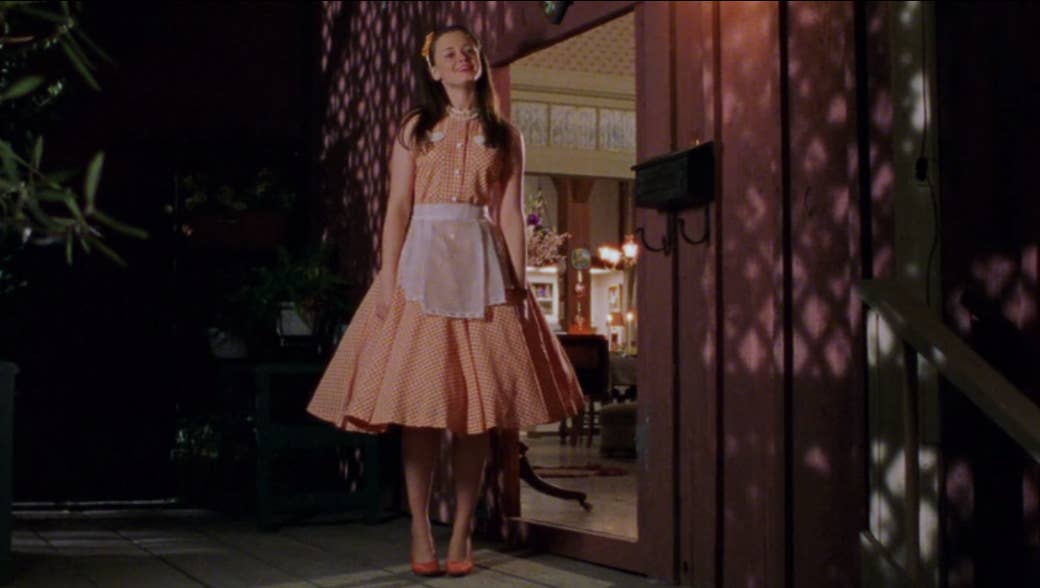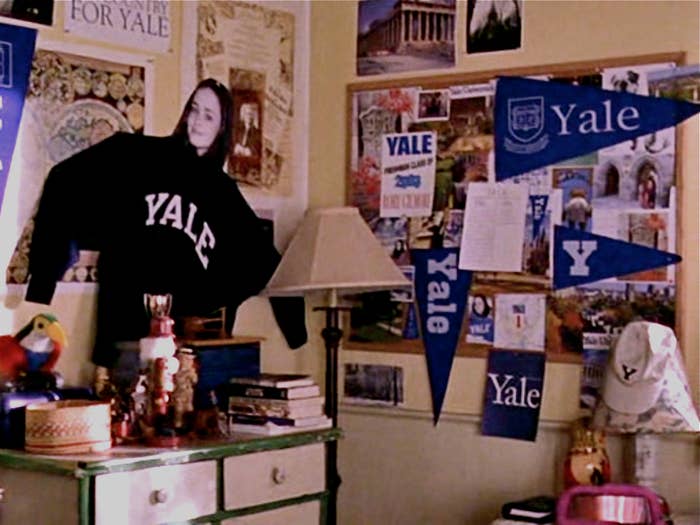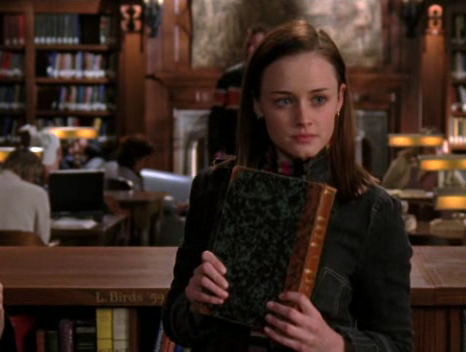
When I was 16 years old, I wrote and saved a digital sticky note on my computer desktop titled "Reasons You Should Be More Like Rory Gilmore." I'd been watching — and loving — Gilmore Girls since the show first premiered in 2000 when I was in the fifth grade, so this was not a short list. It included items like traveling to Europe, getting into an Ivy League college, reading an uncountable amount of books on a regular basis, and falling in love with someone who looked like Jess Mariano. Even the act of making the list was rooted in my admiration for Rory; after all, wouldn’t Rory Gilmore of all people make a list like this as a way to set goals and check them off as she achieved them?
Loving Rory was a no-brainer over the course of Gilmore Girls' seven seasons.
She ate junk food to her heart’s content without exceeding a size 0, studied and read during every waking moment, had a report card collection of straight A’s, and was accepted into every college she dreamed of attending. Her relationship with her mom was the pinnacle of mother-daughter goals, her best friend was cool, and the two hottest guys in town even fought to win Rory’s love and affection. Generally speaking, she was great at everything she did.
Not to mention, Rory was an independent, feminist thinker who looked up to journalists like Christiane Amanpour, initially wanted to write her college essay about the strength and influence of Hillary Clinton, and read Toni Morrison and Sylvia Plath for fun.

In a vacuum, she embodied an idea of perfection I saw all around me in pop culture, especially during my formative years as a teenager when there are so many unrealistic ideals to live up to — images of what beauty is supposed to look like; mixed messages when it comes to dating, sex, and love; and the pressure to be all things to all people at all times.
The social, political, and cultural pressure to be a Perfect Girl didn’t circumvent me, either. I felt individual pressure from myself and my peers to live my “best” possible life, according to elusive standards: be skinny, be beautiful, be smart, be likable, be everything.
I thought Rory was all of those things: the perfect role model in every idealized sense.
But last fall when Gilmore Girls first came to Netflix, I decided to watch the series again in its entirety and remind myself why I fell in love with the show as a high-schooler. I rewatched Rory deliver her valedictorian speech at Chilton, become editor-in-chief of the Yale Daily News, and land a writing gig covering then-Senator Barack Obama on his presidential campaign trail, all thanks to the surplus of straight, white, upper-class, Gilmore privilege that's required to achieve all of these things. This time around, I didn't find myself envying her perfect tendencies nor did I yearn for those similar “perfect” qualities.

After staying up all night for weeks on end to binge-watch Gilmore Girls episodes at 24 years old, it occurred to me that the real strengths of Rory’s character are actually her (sparing) mistakes. They are what make her dynamic, interesting, and authentic. She stops communicating with Lorelai for a while because that's what people do from time to time — they don't always have flawless relationships with their family members and the people who raised them. She gets arrested, takes a temporary leave of absence from college, and doesn’t act like herself for a short time because that's also what people do sometimes — they mess up, they make impulsive decisions without thinking things through, and they act on their emotions.
And when Mitchum Huntzberger tells Rory she isn’t good enough to achieve her dreams of becoming a reporter, when she drops out of Yale, moves in with her grandparents, and deviates from her original plan to take over the world; when she doesn’t get her dream job at the New York Times after graduation, she is far more relatable.
Sixteen-year-old me had a very specific vision for my life: Go to the best possible college I could get into, stay with my longtime boyfriend until we were old enough to plan a more serious and official life together, and get hired at the biggest-name newspaper I could.

Ten years later, it looks like the joke was on me. I didn't get into the most prestigious school I applied to, my boyfriend and I broke up because you don't always marry your high school sweetheart, and the internet took over the media landscape. But just because my "perfect" life didn't come together the precise ways I thought it should, doesn't mean I'm not happy.
I had to grow up, fail, and find beauty in my own flaws and mistakes to realize that human beings aren't perfect; we’re far from it, actually. And as quintessential as Gilmore Girls may have seemed to me during high school, it’s still fiction — life doesn’t always go according to plan; wrenches often get thrown into our dreams. You don’t always get into Ivy League schools, there isn’t a One Size Fits All idea of beauty, and — possibly most important — there’s only one Jess in the world.
I originally thought Rory Gilmore's appeal was in her incomparable excellence, but the pressure to be just like Rory is crushing and unrealistic. After all, whose idea of perfection does she embody, and how attainable is that in reality?
With the recent announcement about a Gilmore Girls revival on Netflix, viewers will be able to see Rory as a twentysomething navigating the difficulties of adulthood. And personally, I hope she's far from perfect — that she's grown up and learned that life's hard because that's when we see how amazing Rory really is.
For whatever reason — OK, mainly because I’m a monster who rarely cleans her computer desktop — I recently came across my "Reasons to be Like Rory Gilmore" sticky note. I re-read the list and decided I was ready to let go of my Rory Gilmore-wannabe self. In order to embrace the person I am, I needed to let go of the perceived perfection that Rory embodies and, instead, love my perfectly imperfect self.
